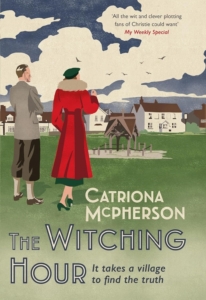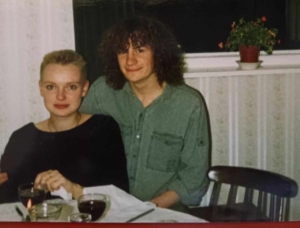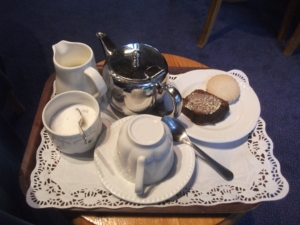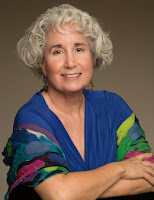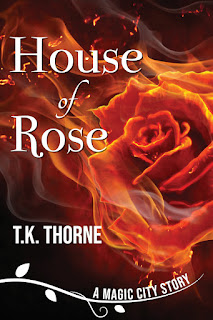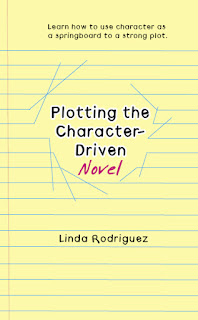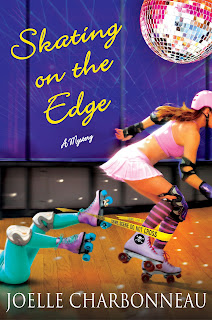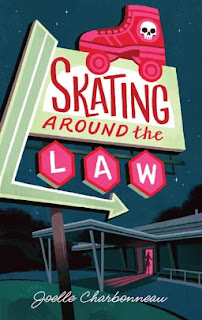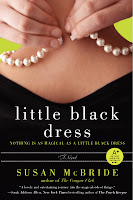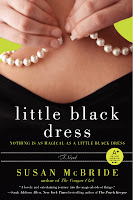Special Guest – Catriona McPherson, The Bride Saw Red
Today we welcome a very special guest back to the blog and she’s chatting about the latest in her A Last Ditch mystery series – Scotzilla.
Catriona take it away!
SCOTZILLA opens at a wedding and we find Lexy Campbell, protagonist of six previous novels about the Last Ditch Motel, whom readers know to be a pretty laidback sort of a person, in full bridezilla mode, breathing fire and turning the air blue because her daisy-style flower fairylights don’t have five petals, which would have been acceptable, or even four petals which would have been an outrage, but three. Three! Like that last-minute, I-don’t-really-care, sales-point gift-flower the orchid. Or like irises. Pond flowers. As if Lexy is supposed to get married under a web of stinking fish lights!
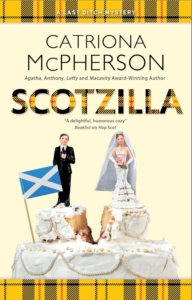
Chapter one was a lot of fun to write. Even more fun was going back to six months earlier at the start of chapter two and slowly charting the gestation of the monster and the rise of her friends’ dismay at what they’re witnessing, alongside the seeds of the murder plot.
I don’t even think I’ve made her over-the-top. Anyone who reads Carolyn Hax has seen brides this uncorked and I heard of a real life example where my niece offered to pass on her wedding reception fairylights to a friend, in a spirit of generosity and in recognition of how expensive weddings are. The friend burst into tears at the news that someone else was having fairylights at their wedding before she did. Ummmmmm.
Not every bride, mind you. Another niece of mine got married this summer and arrived at the venue only to discover she’d forgotten her veil. Enh, she got married without a veil. And yet another niece (I’ve got a fair few) proudly wore white shoes that cost a tenner because, and I quote, “They’re going to get wrecked and I’ll never wear them again.” That’s my girl.
I never wanted a wedding of my own, and I don’t regret not having one, but that’s not to say I don’t sometimes enjoy them. At a good wedding, I love the ceremony, the speeches, the catch-up with family, sitting out “All the Single Ladies” and getting up for “Solid as a Rock”, the cup of tea that’s served after a couple of hours of dancing, along with savoury and sweet pastries, the tiny wee baby boys in kilts, the post-mortem on the way home . . . (Who was it who said that in a happy marriage you never tear each other down; you tear other people down together? Not me.)
What don’t I love about weddings? Or – to put in another way – what makes for a bad wedding? Well, when you think one of the couple is making a mistake. That’ll do it. (I’d love to be at a wedding where someone objects, soap-opera style. Does it ever happen in real life?) A terrible DJ who wants to look cool and won’t fill the floor is a bit of a drag (see above: Beyonce/Ashford and Simpson). If there are enough Scots to warrant ceilidh dances but not enough to form a critical mass of people who know what they’re doing; that’s frustrating. Getting stuck with really hard-work people who make no effort to have fun but won’t stop hanging around you. (Same reason I’d never go on a cruise. I would be in the next cabin to and the same table as a crashing bore with no boundaries. And they’d live in the next town when we all got home again.)
What don’t I love about weddings that I probably shouldn’t admit to? Home-made vows. Love the speeches for the toasts, but oh my God the throbbing emotion of a home-made vow makes my toes curl so much I could snap my dancing slippers. (Although, I immediately start to remember exceptions to this rule. A wedding last summer had the sweetest and funniest vows anyone ever spoke – things like “I will always drive you anywhere you want to go because you hate to drive”.) But, usually, home-made vows. Also – the photographer. The time it takes, the hanging about for everyone, the knowledge that no one is ever going to look at 99% of these pictures. Ever. And if there’s a videographer too? Guess.
So my nightmare wedding would be an ill-suited couple of Instagram influencers, who wrote rhyming vows, blew most of their budget on the photographer and videographer and are determined to get their money’s worth, saved a few pennies by letting a relative – huge fan of modern jazz – be the DJ, banned all children, didn’t allow speeches, and one last thing. Where is this hellacious event taking place? Where else? At a “destination”.
Unless anyone wants to convince me that destination weddings are a great idea. No? Tell you what then: let’s really get going on this calamitous event I’ve started designing. What else does it need? I haven’t touched on the menu . . .
Here’s a little bit about SCOTZILLA
Lexy Campbell is getting married! But in the six months of planning it took to arrive at the big day, she has become . . . a challenge. Friendships are strained to breaking point, Lexy’s parents are tiptoeing around her, and even Taylor, her intended, must be having second thoughts.
Turns out it’s moot. Before the happy couple can exchange vows, Sister Sunshine, the wedding celebrant, is discovered dead behind the cake, strangled with the fairy lights.
Lexy’s dream wedding is now not just a nightmare: it’s a crime scene. She vows not to get drawn into the case, but the rest of the Last Ditch crew are investigating a bizarre series of goings-on in Cuento’s cemetery and every clue about the graveyard pranks seems to link them back to Lexy’s wedding day. Will the Ditchers solve the case? Will Sister Sunshine’s killer be found? Will Lexy ever get her happy-ever-after? Not even Bridezilla deserves this.
Thanks so much, Catriona, for stopping by. We love stories set in Scotland and we love Catriona! So needless to say, we already have our copy of Scotzilla!

Serial awards-botherer, Catriona McPherson (she/her) was born in Scotland and immigrated to the US in 2010. She writes: preposterous 1930s private-detective stories; realistic 1940s amateur-sleuth stories about a medical social worker; and contemporary psychological standalones. These are all set in Scotland with a lot of Scottish weather. She also writes modern comedies about a Scot out of water in a “fictional” college town in Northern California. SCOTZILLA is book number seven of what was supposed to be a trilogy. She is a proud lifetime member and former national president of Sisters in Crime. www.catrionamcpherson.com


